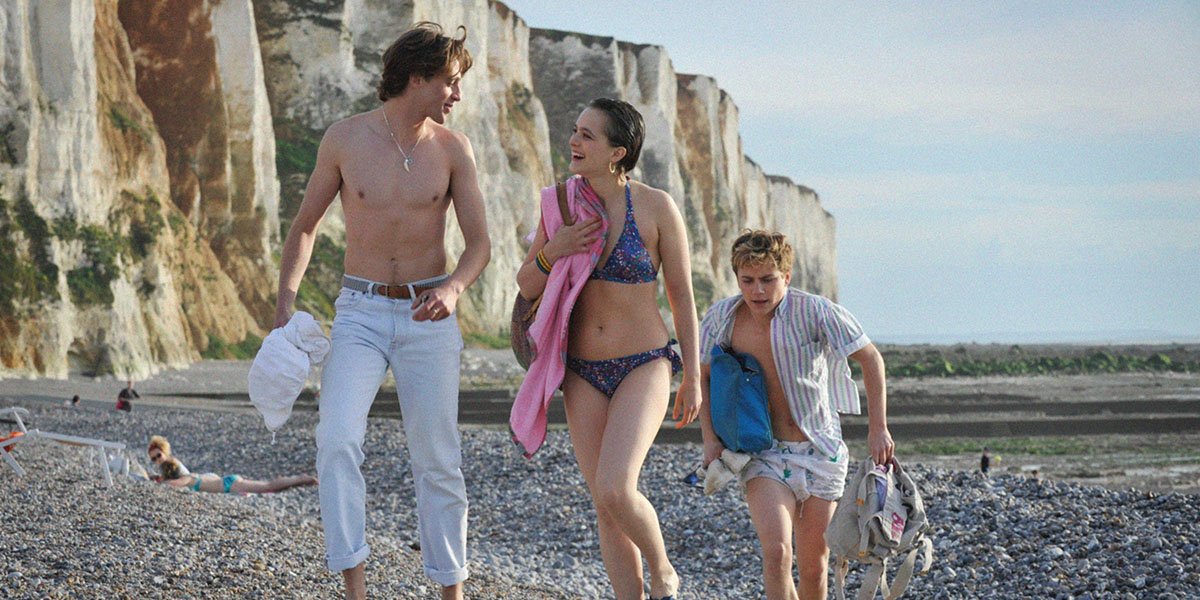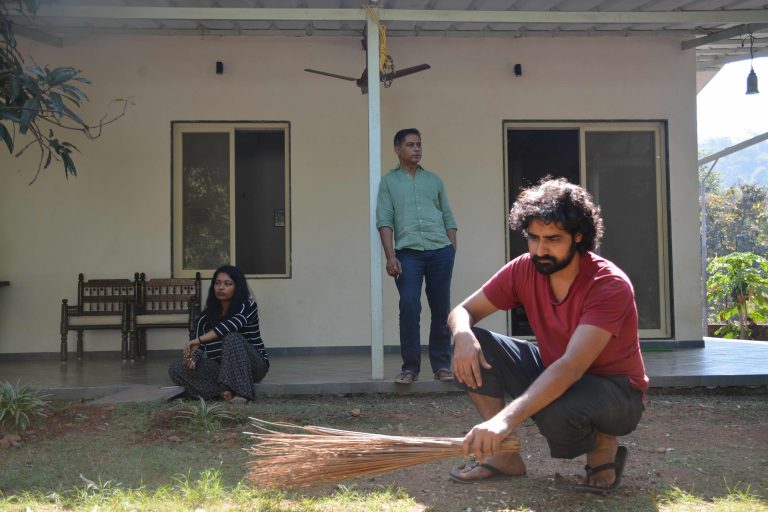Q. Why did you decide to make David’s family Jewish?
Ozon: The family in Aidan Chambers’ book is Jewish, and I kept it. When I asked him about it, he explained that the town of Southend-on-Sea (where the novel is set) has a large Jewish community. It therefore seemed natural for David to be Jewish, and at the same time set him apart from Alex with respect to their social and cultural backgrounds.
I like the fact that it is never an issue. Just like being gay, it belongs to the narrative just like its other parts.
There is also a narrative reason, which has to do with Jewish post-mortem and funeral rituals. In Judaism, the body should be buried as soon as possible, the funeral usually taking place within one or two days after the death. Alex could not mourn with the body, nor could he be among the mourners. These restrictions increased his emotional trauma and fueled his psychological need to dance on David’s grave. It was the only way for Alex to express his profound sorrow and let everything out.
Related to Interview with François Ozon – Silver Bear winner Angela Schanelec on “I Was at Home, But” (2019), Interview
If David had been Christian, Alex would not have had to endure the same torments following David’s death. Everything would have been simpler, more straightforward, and thus less interesting to me.
Q. How did you go about casting the couple of Alex and David, whose physiques are extremely different?
Ozon: I started casting quite early on, before I’d even finished the script. I told myself that if I couldn’t find the actors, I wouldn’t make the film.
I very quickly met Félix Lefebvre. I immediately knew he was Alex when he auditioned, with his roundish face, childish smile, and his liveliness. He has a melancholy look in his eyes which gives him an air of River Phoenix that corresponds perfectly to the era and the character. Félix is a quick, clever actor, which was vital for the role. We have to believe in Alex’s intelligence, and in his ability to become a writer.
Then I had to find David. The contrast between him and Alex was important. I wanted David to physically dominate Alex, to have an effortless poise, and naturally be at ease with himself. David is a bit like a wild animal while Alex is a lamb whose demeanor is awkward, whether he’s walking or sailing a boat. Benjamin Voisin had auditioned for the role of Alex, but when I saw him act, I had a hunch that he could be David. Although I had been looking for someone who was more physically imposing and sturdily built, at the same time, when we see David from Alex’s point of view, he is indeed like that.
There was true chemistry between Benjamin and Félix from the first screen tests, which was vital. They were on the same page – two kindred spirits. Then we did several readthroughs and rehearsed scenes together. And one month before the shoot, they left to spend a week sailing with each other in Le Tréport.
Q. What about choosing the other actors?
Ozon: For Kate, I was at first looking for a girl who exuded more sexuality than Philippine Velge, but her tomboy, Jean Seberg side immediately appealed to me. Philippine is Belgian-English, and she has both the grace and maturity that I was looking for in this character, who helps Alex through the mourning process.
Like most people, I discovered Isabelle Nanty in Auntie Danielle and I’m tremendously fond of her. She radiates a great sense of humanity. We’ve rarely seen her in a dramatic register, and I wanted to place her in a different context to show another facet of her personality and work.
As for Melvil Poupaud and Valeria Bruni Tedeschi, with whom I have already worked, they were the obvious choices for these roles. After By the Grace of God, it was fun to make Melvil a flirty professor – the professor all of us have had at one point or another in our lives – really nice but a little bit creepy. Valeria was the ideal person to bring some humor and a pinch of craziness to this extroverted mother; she’s able to make us accept her more dramatic transformation. For this character, I thought about the monstrous and conniving mother in Tennessee Williams’ Suddenly Last Summer played by Katherine Hepburn in Mankiewicz’ film – a mother who lures boys and reels them in for her son, and whose possessive, devouring, incestuous nature is later revealed.
Q. Swimming pool, Angel, In the house… This isn’t the first time you’re tackling the figure of an author.
Ozon: I’m interested in depicting the artistic vocation. How a character is driven to go through self-transcendence as part of the creative process, and what he draws upon for inner nourishment.

What I find beautiful about Alex’s situation is that he discovers writing almost accidentally: he is incapable of talking about what happened and so is told to write it down in order for the judge to understand what he did and why. “Sometimes, things we have a hard time voicing are easier to write down,” his professor tells him. Especially at that age. As he has a gift for writing, this works in his favor. By becoming a writer, Alex is doubly saved: before the judge and because he has found his vocation.
Alex has a very resilient side thanks to his writing, which allows him to transform the ordeal he has gone through and move forward.
Q. How did you put together the dance on the grave?
Ozon: First, we had to find the music. In the book, it’s the Laurel and Hardy theme song, music that evokes a cuckoo clock – hence the French title of the book La Danse du Coucou [The Cuckoo Dance]. For the movie, it was Félix who suggested using the Rod Stewart song Sailing, which is in fact from 1975. As soon as I listened to it, I knew it was the right song, at once for its rhythm and lyrics.
I immediately thought of Angelin Preljocaj for the choreography, but as he is in the south of France, logistics were a little complicated. He then referred me to a dancer with whom he works, Virginie Caussin. I wanted the dance to feel genuine and be inspired by Félix’s own body language. At first, he gets on his knees and caresses himself as the rhythm gradually takes over his body. We asked Félix to dance naturally to the music in order to incorporate his own body movements, as well as gestures that are reminiscent of the way people danced in the 80s. This was coupled with other moments when he lets go completely, giving off pure energy, but channeled by a choreography that evokes a tribal, funerary dance.
Q. Why did you bring in Jean-Benoît Dunckel to compose the music?
Ozon: I wanted music that was sexy, romantic and nostalgic; something that would remind us of the 1980s and the beginnings of electronic music. All these aspects can be found in Jean-Benoît’s music. I have always enjoyed the work he did when he was in the band Air.
And it turns out that in an interview where he was asked to give the title of a song he liked when he was young, he’d answered: Stars de la pub, [an 80s hit pop song], saying that it was a really well produced song. I took this coincidence as a sign because it was also one of my favorite songs when I was a teenager.
So I contacted him, and I explained that I wanted to use the very song he’d mentioned in my film. I gave him the script, from which he composed themes without having seen the images. It’s quite extraordinary because during the editing process we used the melodies exactly as they were written.
Also, Read – Interview with Celine Sciamma – Director of “Portrait of a Lady on Fire”
Q. And the film’s title?
Ozon: The French title of the book, La Danse du Coucou [The Cuckoo Dance], didn’t work because we changed the music for the grave scene. The original title of the book is very beautiful: Dance On My Grave, but it revealed too much about the movie’s storyline, which is unlike the book, where you learn everything from the onset. So I simply connected it to the date when I read the book and when The Cure song, which opens the film, In Between Days, came out. This song really marks the heart of the 80s while also remaining timeless. It’s an extremely joyful song, but
fundamentally melancholic. It corresponds to Alex, to his enthusiastic discovery of life, but to its dark side as well.
1985 is also the year Rock Hudson died, and AIDS suddenly appeared in everyone’s daily life. It’s the last year of carefreeness and innocence when it was still possible not to be aware of the disease, and not to worry about it.
Q. “The only important thing is that somehow we all escape our history,” says Alex in voice-over at the very end of the film.
Ozon: It’s the last sentence in Aidan Chambers’ book; it’s beautiful and enigmatic. I identify with it completely.



![[Watch] Churuli Trailer : Another Bewitching Dark Mystery from Lijo Jose Pellissery](https://www.highonfilms.com/wp-content/uploads/2020/07/Churuli_Lijo_Jose_Pellissery-768x334.jpg)
![Take Me Somewhere Nice [2020] MUBI Review – ‘Stranger than Paradise’ with a female-gaze](https://www.highonfilms.com/wp-content/uploads/2020/05/Take-Me-Somwhere-Nice-highonfilms-768x432.jpg)
![Money, Fascism, and Some Sort of Acid [2021] Review – An expertly mounted collage that looks at modern society’s shortcomings](https://www.highonfilms.com/wp-content/uploads/2021/12/Money-Fascism-and-Some-Sort-of-Acid.jpg)
![Who You Think I Am [2020] Review: A layered physiological fallout due to Catfishing](https://www.highonfilms.com/wp-content/uploads/2020/05/Who-You-Think-I-Am-768x405.jpg)

![Quo vadis, Aida? [2020] Review: A tense and terrifying retelling of the events leading up to the Srebrenica massacre](https://www.highonfilms.com/wp-content/uploads/2021/05/Quo-Vadis-Aida-2-highonfilms-768x432.jpg)